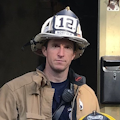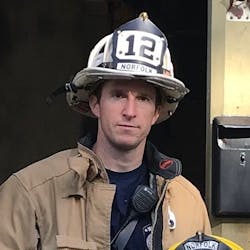4 Expectations Every Company Officer Should Set for Their Crew
I am a big believer in setting expectations with my crew. I think this is something that every company officer must do early when getting their new assignment.
There are many ways to deliver your expectations to your crew. One approach: You can go into detail on what you expect on calls, duties around the firehouse, and what you want to see on the fireground and EMS scene. Here I’ll share with you a few pillars that, when expressed to your crew, should capture the lion’s share of your expectations as a company officer.
- Be ready
- Look professional
- Act professional
- Take care of each other
These are very simple expectations, but really cover a broad spectrum of behavior.
1. Be ready
This goes from mindset all the way up to execution. When you come through the doors of the firehouse, your members need to be locked on and engaged! Their landscaping side work, real estate meetings or other part-time responsibilities are important, but not as important as what they just showed up to do. When at the firehouse, they need to BE at the firehouse.
Being ready includes the condition of their apparatus. Every spanner wrench, crosslay and SCBA should be ready to go immediately. If it’s not that way, then we fix it. We don’t blame it on the C shift (always the troublemakers). We take ownership of that rig and do what needs to be done.
Having their gear staged and ready to turnout quickly is also important. It is no good balled up in the back of the rig or, what’s even worse, still in the locker nowhere close to the trucks.
When you return from a call, it’s back into staged gear, ready to do it all over again. Seconds add up. Seconds save lives.
Training and physical fitness also fall under this category. Having a well-trained crew should be a priority for so many reasons. It fosters unit cohesion, builds efficiency and leads to positive outcomes on the incident scene. Your crewmembers need to know that training is valuable and should expect a consistent training program while you are there. Keeping themselves in good physical conditioning coupled with a consistent training regimen can only lead to success. They may be able to talk their way through a high-rise fire, but if they can’t make it to the upper floors, what good are they? Always be ready!
2. Look professional
Uniform appearance is a big deal for me. We are professional public servants and we need to look the part. Walking into someone’s home with an unsatisfactory uniform appearance only shows a lack of pride. Your firefighters should be proud of the department they serve—its history, its record of service and what it does for the community.
They should also be prideful in the company for which they work. I don’t care if it’s the busiest house or the slowest house, it’s THEIR house, and they should be darn proud of what they can bring to the table. So when they walk into the grocery store, city hall or Mrs. Smith’s living room, they should have the appearance that they take pride in who and what they represent.
Maybe it’s the military in me, but I expect uniforms to always be squared away; however, there must be some give and take. My crew knows that during the day, shirts are tucked in and we look like professionals on calls and in the firehouse. In the late afternoon or after dinner, if they want to pull their T-shirts out of their pants and dress down a little bit, that is fine with me. I want them to be able to unwind and do that, but when the brass hits, we square away that uniform and head out the door. We look just as professional at 2 a.m. as we do at 2 p.m. Call me petty, but a uniform appearance can tell me a lot about a person and just how much they care.
3. Act professional
Just because we look the part doesn’t mean we’re out of the woods. Your firefighters need to act the part as well. After all, we are professionals, right? This comes down to the behavior that is allowed to take place in the firehouse all the way to how they converse with and treat the public. Once again, there is an image to uphold. Your firefighters need to know what boundaries are in place and when they push them. Far too many problems could have been fixed before they grew out of control. It only takes a little accountability and a few difficult conversations. Most big problems didn’t start out that way. They were allowed to fester for too long because there was no line in the sand, no expectations. There was a boss who decided to look the other way instead of just being a boss.
Your crewmembers’ interaction with the public should be positive and productive. We have all been there when a patient has really pushed our buttons. Your firefighters need to know that as soon as they lose their cool, they lose all together. They should remain in control of their emotions and be the calm during the storm. Be that level-headed professional.
There are three things every one of us must consider when making a decision:
- Is this good for the public?
- Is this good for the department?
- Is this good for my station?
If that decision is going to have a negative impact on any of those three things, we better be very sure about what we are about to do and be ready to answer for the decisions that we make. It amazes me how many millions of dollars in lawsuits and how much public trust has been lost in our fire departments simply because we didn’t act like professionals. Even worse, a company officer somewhere knew about it and failed to get ahead of it. Don’t be that person. Forecast problems, have the hard conversation, and make sure your people act professional.
4. Take care of each other
This one is so simple, but so important. Just take care of each other. That’s it. Just look out for one another. I think we forget just how much we count on each other to get this job done. We are a team and we should act like one. We don’t talk behind each other’s back in the firehouse. Your crewmembers need to know that you require an environment where problems are brought to the surface and handled at the lowest level possible. They need to understand that you want them to be a phone call away if something comes up while off duty. We pride ourselves on words like family and brotherhood. We shouldn’t just toss those words around so gently. Ensure your crew knows how much you care about them. I tell my crew all the time that I am here for them. My job as their company officer is round the clock. Your crew should be able to pick up the phone and call anyone on that shift roster without the first words out of their mouth being, “I hate to bug you, but….” If this idea of family and cohesion is important to you, it will be important to them. We must take care of each other.
Final thoughts
With just these four expectations, you will be able to tackle so many questions that may be raised about the decisions you make:
- Why do I have to get a new duty shirt, captain? Because I expect you to look professional.
- Why are we going out and training today, lieutenant? Because I expect us to be ready.
- Why didn’t you just tell that patient what you really thought? Because we are professionals.
- Why are we all in this room talking about this? Because we take care of each other.
Once again, expectations are a must and you set the tone as that company officer. Set your crewmembers up for success. If they go out the door and make a bad call and you haven’t done this, you share in the blame. If you have, then there will be some level of accountability because you made them aware.
I hope these four simple things can help keep your firehouse running as a well-oiled cohesive machine. They can be communicated quickly and with easy explanation. Good luck!
About the Author

Jarrod Sergi
Jarrod Sergi is an 18-year student of the fire service, spending the last 13 years with Norfolk, VA, Fire Rescue, where he is a captain of an engine company. Sergi has assisted in the development of multiple department-wide and regional training programs covering fireground operations and fire dynamics. He is a state instructor for both the Virginia Department of Fire Programs and the National Fire Academy focusing on mayday and strategy/tactics. Sergi is a graduate of the National Fire Academy’s Executive Fire Officer Program and founder of Trial by Fire, whose mission is to advance the fire service through strong leadership, accountability and training.
